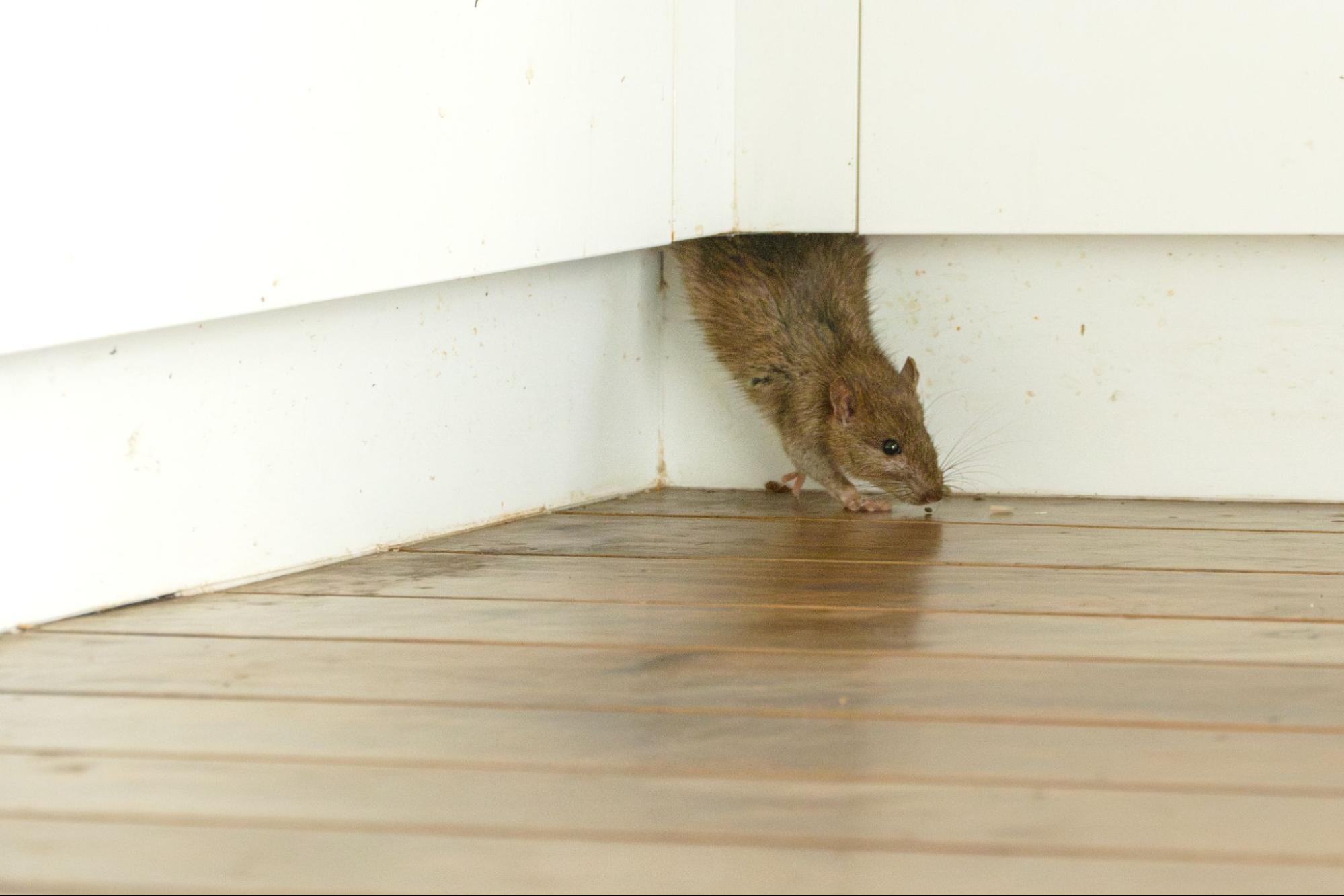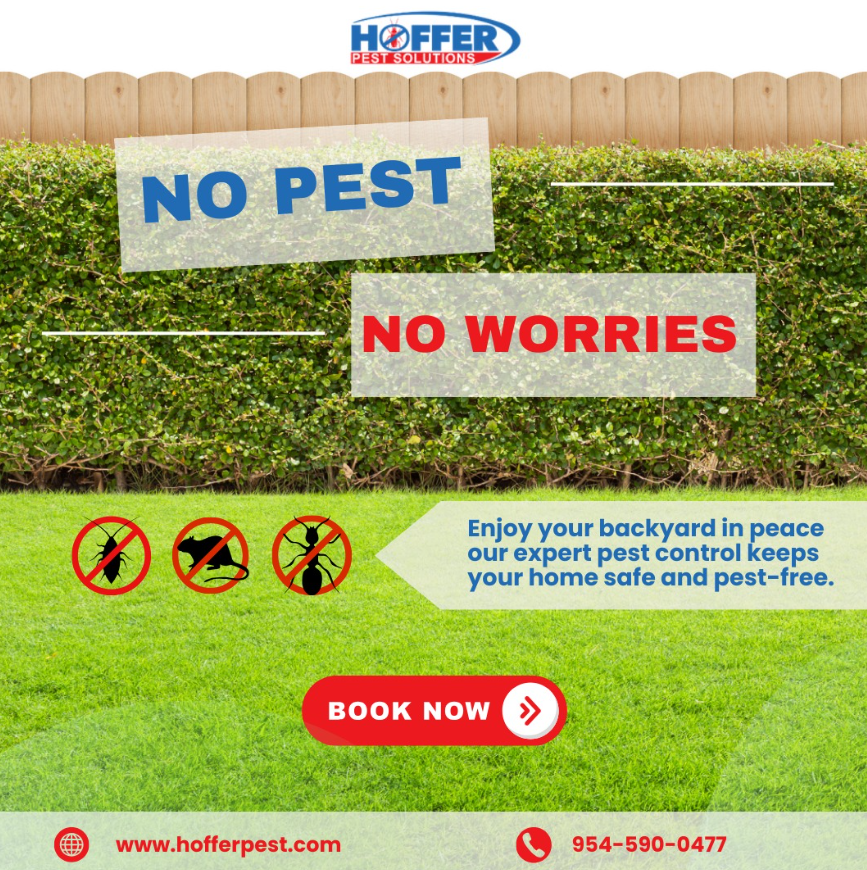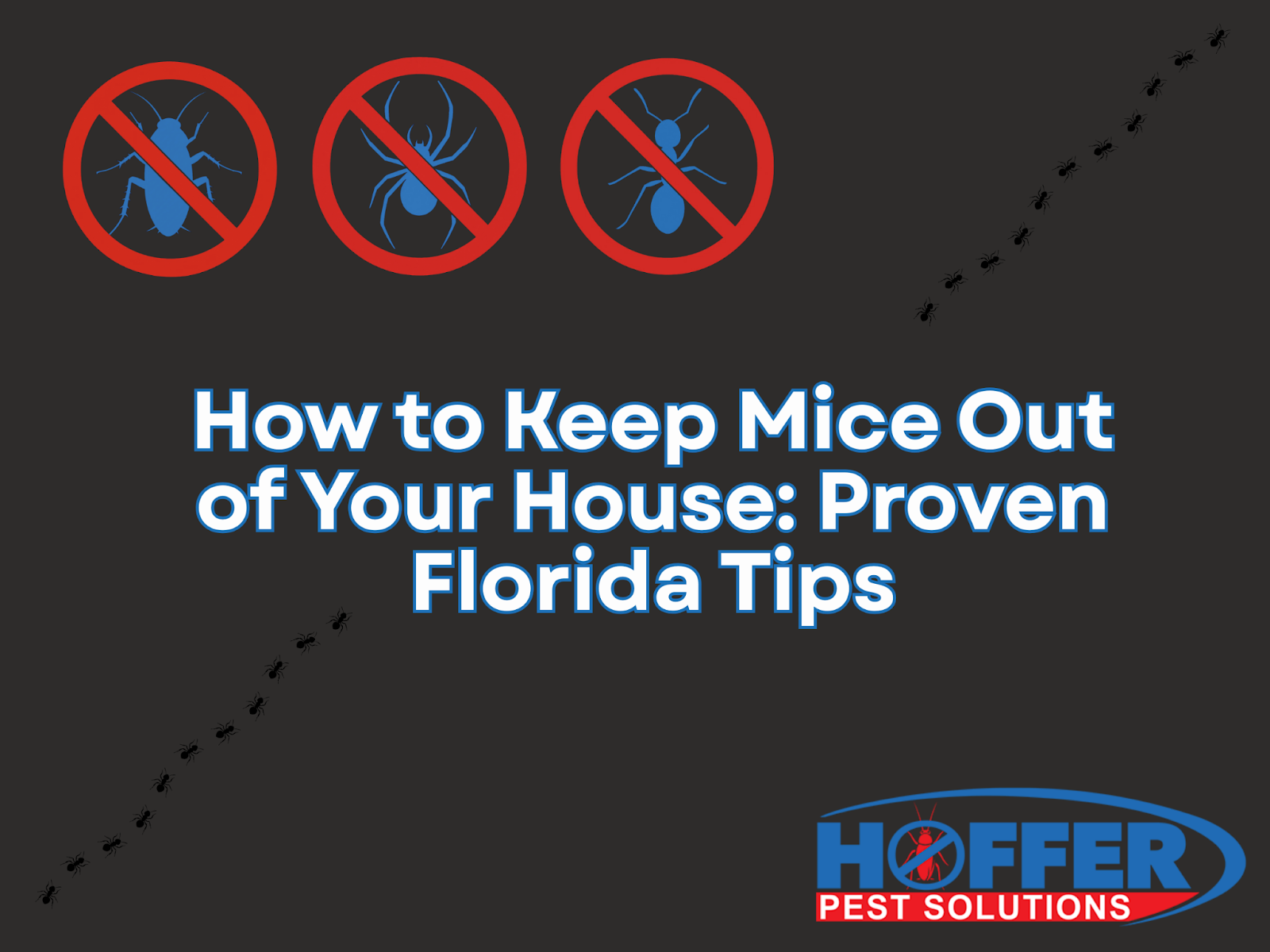The best way to keep mice out of your house is by sealing entry points with steel or copper wool, storing food in airtight containers, and trimming outdoor vegetation. In Florida, year-round rodent pressure makes exclusion and prevention key to protecting your home.

To keep your home truly rodent-free, you also need to address hidden plumbing gaps, maintain your yard, and avoid common mistakes that invite mice back inside. Many homeowners try poisons and traps, only to find that the problem returns season after season.
Hoffer Pest Solutions spent more than 40 years helping South Florida families protect their homes with proven exclusion techniques and same-day service when infestations strike. Our approach doesn’t just stop the mice you see, it keeps new ones from ever getting in.
If you want the full breakdown, keep reading. Below we’ll walk through the exact steps Florida homeowners can take to keep mice out for good, when to call in professional help, and why our local expertise makes all the difference.
Step-by-Step Guide to Keeping Mice Out of Your House

Now that you know why mice target Florida homes, let’s walk through the proven steps that actually keep them out. From sealing tiny gaps to eliminating food sources, each step builds on the last to create lasting protection.
Step 1: Seal Every Gap
The key step in rodent prevention is exclusion. Mice can squeeze through openings as small as a quarter inch, about the width of a pencil. Start by inspecting the foundation, walls, doors, soffits, vents, and especially plumbing and A/C cutouts, which are common Florida weak spots.
Seal holes with steel or copper wool, secured with metal mesh or caulk. Spray foam is tempting for convenience but completely ineffective, rodents chew right through it. Many professionals prefer copper wool for its rust resistance and durability over time. By eliminating those hidden entryways, you cut off the steady flow of new intruders, which is why this step matters more than any trap or repellent.
Step 2: Eliminate Food & Water Sources
Even a perfectly sealed home will attract mice if food and water are readily available. Store dry goods like flour, cereal, and sugar in airtight plastic or metal containers instead of paper or cardboard packaging. Keep pet food sealed and avoid leaving bowls outdoors overnight, which creates a reliable buffet for rodents.
Indoor and outdoor garbage should always be covered. Inside, empty bins frequently. Outside, use lids secured with bungee cords or heavy rocks. In Florida yards, fallen fruit from trees can draw rodents from a distance, regularly clearing this debris cuts off another attractant. By making your home and yard less appealing, you tip the scales in your favor before rodents even attempt entry.
Step 3: Outdoor Landscaping & Habitat Control
Rodents prefer to travel under cover, and dense landscaping provides the perfect highway straight to your walls. Trim shrubs and vegetation back at least 18 inches from your foundation. Keep mulch, compost piles, and bird feeders well away from your home’s perimeter, since they attract rodents looking for easy meals.
Yards, garages, and sheds filled with clutter provide nesting options that encourage populations to grow. Regularly clearing these spaces denies rodents the hiding spots they thrive on. Many homeowners ask whether trapping alone is enough, but without addressing habitat, new mice will simply replace the ones you catch. True control requires removing both entry and attraction.
Step 4: Repellents & DIY Tactics
Homeowners often experiment with natural or DIY repellents, and while some can help, most are short-term fixes. Peppermint, eucalyptus, and pine oils can disrupt rodent scent trails, but they require frequent reapplication, every two weeks at minimum, to remain effective. Baking soda piles can help neutralize musky odors and may deter some mice, but they do not eliminate infestations.
Dryer sheets in cabinets or drawers sometimes discourage activity due to their chemical scent, but their strength fades quickly. Other home remedies, like Irish Spring soap or strobe lights in attics, are largely anecdotal and should not be relied on as primary defenses. Instant mashed potato flakes, touted as a “safe poison,” swell in the rodent’s stomach but are not reliable long term. Even mixtures of diatomaceous earth, cayenne, and mint may only delay, not stop, infestations.
DIY repellents can supplement your efforts, but they cannot replace exclusion, sanitation, and professional intervention when needed.
Step 5: Traps, Pets, and Natural Predators
When mice do make it inside, traps remain the most effective and humane method of removal. Snap traps kill instantly, while live traps can be used if you plan to release mice at least two miles away. Glue traps, while common, are inhumane and can cause prolonged suffering or partial escapes.
Pets can help, but results vary. Some cats are avid hunters, while others prefer to “play” with mice rather than kill them. Terriers and other hunting dog breeds often prove more reliable. Outdoors, owls and other natural predators provide a natural check on populations, but they cannot manage infestations inside your home.
Ultimately, traps and pets may control visible activity, but they are only part of a broader plan. Without exclusion and habitat reduction, new mice will continue to appear.
Why Mice Get Into Florida Homes
In Florida, keeping mice out of your home is a year-round battle. Unlike colder states where rodent pressure spikes in winter, South Florida’s warm climate keeps mice active 12 months of the year. They slip inside seeking food, shelter, and cool or warm spots depending on the season.
Structural vulnerabilities like water damage, rotted wood, and gaps around plumbing lines make it easy for them to enter. Kitchens, garages, and attics provide the perfect trifecta of food, water, and nesting insulation. Many homeowners grow frustrated when poisons stop working, or when they catch a few mice but still hear scratching in the walls.
This is proof that exclusion, not just elimination, is the long-term solution.
Spotting the Signs Before It Gets Worse

Mice are stealthy, but they leave behind clues that attentive homeowners can catch early. Droppings that look like black grains of rice often appear in cupboards, pantries, or along baseboards. A pungent, musky odor builds as infestations worsen. Gnawed food packaging, chewed wires, and shredded nesting materials tucked into quiet corners confirm activity.
Pets often notice what we don’t. Dogs may stare at a wall for hours, and cats may toy with mice but fail to eliminate them. If you start hearing scratching in the attic or walls at night, chances are the mice have already found a way to settle in. Acting quickly at this stage makes prevention far easier than waiting until an infestation is well established. If you see any signs, call Hoffer Pest Solutions for quick inspection.
Why Florida Rodent Control Is Different
In northern climates, homeowners typically face rodent problems in the fall and winter as temperatures drop. In Florida, the challenge is ongoing. The subtropical climate keeps rodents active year-round, and seasonal weather events like hurricanes create structural damage that opens up new entry points. High humidity also accelerates wood rot, giving mice easy access.
This means Florida homeowners can’t afford to “wait out” a season. Prevention here must be consistent, proactive, and built around the realities of our environment. DIY methods can buy time, but they rarely solve the root problem, entry points in structures that rodents will keep exploiting until sealed properly.
When to Call the Pros
There comes a point when do-it-yourself approaches aren’t enough. If you’ve set traps but continue to hear scratching in your attic, or if poisons no longer seem to work, it’s time to bring in professionals. Mice nesting in walls or attics can be difficult, if not impossible, to eliminate without the right tools and exclusion strategies.
Another concern is safety. Rodenticides placed outdoors pose risks to pets, wildlife, and even children. Professional pest control providers use targeted exclusion and baiting methods designed to minimize these dangers. Most importantly, professionals stop the cycle that keeps new ones coming back. Ongoing monitoring and perimeter bait stations reduce population pressure before rodents ever reach your walls.
Hoffer Pest Solutions: Florida’s Local Rodent Experts

Hoffer Pest Solutions have been protecting South Florida homes from rodents for more than 40 years. As a family-owned company, we live in the same communities we serve, so we understand the unique challenges local homeowners face. From sealing plumbing cutouts and attic gaps to providing same-day service during emergencies, we’ve built our reputation on trust, reliability, and results.
Our rodent exclusion services go beyond quick fixes, we identify structural vulnerabilities, implement long-term sealing solutions with materials like copper mesh, and provide ongoing monitoring so you don’t face the same problem again next season. And because we stand behind our work, our satisfaction guarantee means we’ll return at no charge if rodents persist after treatment.
Protecting your home from mice is about safeguarding your family’s health, your property’s value, and your peace of mind. When you’re ready to take action, trust the locals who have been serving South Florida for decades.
Take Back Control of Your Home
Keeping mice out of your house is about sealing entry points, eliminating attractants, and creating an environment where rodents can’t thrive. In Florida, the challenge never goes away on its own, which is why prevention and help matter so much.
We’ve been helping families in South Florida live rodent-free for over 40 years. If you’re tired of scratching in the walls or worried about infestations returning season after season, now is the time to act. Call Hoffer Pest Solutions today for a free inspection and let us help you protect your home, your family, and your peace of mind.
Frequently Asked Questions (FAQ)
What is the best way to keep mice out permanently?
The most effective long-term solution is exclusion, sealing every potential entry point with steel or copper wool and mesh. Combined with proper sanitation and habitat control, this prevents new rodents from entering, rather than just dealing with the ones already inside.
Do natural repellents like peppermint oil really work?
Yes, but only for short periods. Essential oils such as peppermint or eucalyptus can disrupt rodent scent trails, but they require frequent reapplication. They’re best used as supplemental deterrents, not as a standalone solution.
Why do mice keep coming back even after I’ve trapped some?
Trapping reduces numbers temporarily, but unless entry points are sealed, new rodents will take their place. Mice breed quickly and can exploit the same vulnerabilities repeatedly. Exclusion is the key to breaking the cycle.
Are DIY tricks like baking soda or mashed potato flakes effective?
These remedies may show minor results, but they’re not reliable long-term. Mice often adapt or ignore them, and infestations typically continue. Professional exclusion and monitoring are far more effective and safer, especially in Florida’s year-round rodent climate.
When should I call a professional for rodent control?
If traps and repellents aren’t solving the problem, or if you suspect mice are nesting in your attic or walls, it’s time to call in pest control. Professionals can identify hidden entry points, safely eliminate infestations, and prevent future invasions with proven exclusion methods.


